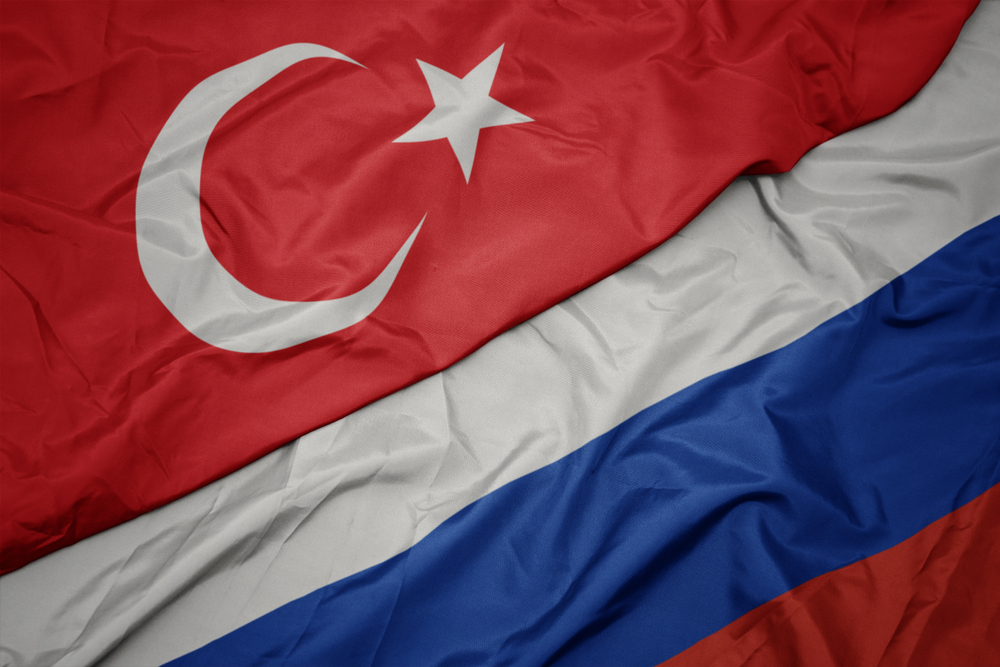Relations between Turkey and Russia became tense after Turkey exported drones to Ukraine and provided it with various forms of support in the realm of defense. The relationship between the two countries deteriorated further after the Turkish Foreign Ministry condemned the Russian attack on Ukraine and declared it as unacceptable, as well as refusing to recognize the independence of the two self-proclaimed republics of Donetsk and Lugansk in Eastern Ukraine.
The Turkish Foreign Ministry viewed Russia’s actions as a breach of the Minsk accords, and a blatant violation of Ukraine’s sovereignty. President Erdogan condemned Russia’s recognition of the independence of the two self-proclaimed republics as a blatant breach of Ukraine’s sovereignty, proclaiming his country had certain responsibilities due to its location on the black sea. As Russian military operations in Ukraine escalated, Turkey went further in statements by its foreign minister and designated Russian actions in Ukraine as a “war”, with implications for the possible ban on the passing of Russian ships through the Turkish controlled straights out of the Black Sea, the Bosphorus and Dardanelles, according to the terms of the Montreux Convention.
There are several motives behind Turkey’s stance in condemning Russia’s attack on Ukraine, which include:
1- Containing Russian influence: Turkey has an interest in stemming Russia’s expanding interest in the Caucuses and Central Asia. Russia’s success in keeping the former soviet republics within its sphere of influence, would adversely impact Turkey’s role and influence in the Black Sea region. This led Turkey to refuse to recognize Russia’s annexation of Crimea in 2014, as well as the separist stance of Donetsk and Lugansk. It also prompted it to refuse to recognize the declaration of independence by these regions which preceded the present crisis.
2- Protecting ties with Ukraine: Turkey is aiming to protect its relations with Ukraine, which it perceives as a vital and strategic ally against Russia. The amount of trade between the two countries is expected to reach more than 10 billion dollars annually, following the latest free trade deal that was signed during Erdogan’s visit to Ukraine this February. Turkey has a strong influence in Ukraine and is reputed to have supported the Ukrainian Church’s independence from the Russian Orthodox Church. Ukraine is now considered to be the 2nd largest importer of its Drones, as it added 6 planes to its 383 Fighter Battalion of the TP 2 type. The two countries last August established a joint company, the “Black Sea Shield”, with the aim of building the next generation of drones. Joint defense productions also went to new heights with the first jointly built frigate, which should be ready by the year 2023.
3- Improving Relations with the US: Turkey’s stance regarding Russia’s attack on Ukraine is also calculated to improve relations with the US, and highlight Turkey’s strategic importance in containing Russia, with its control of sea traffic into the Black Sea. Turkey’s stance, in line with US policy, appears to have helped to move the still waters regarding Turkish- US relations, as President Erdogan announced that talks regarding the F-16 fighters are “going well”.
4- Harmony with Europe: Turkey’s stance is also a message to European countries that have stalled its bid for membership in the EU. It illustrates that Turkey will not side with Russia, and remains a corner stone in maintaining European security, and a bulwark against Russian aggression. Turkey seeks to highlight that its closer relations with Russia recently are a product of necessity and the preservation of Turkish interests, an outcome of Russia’s strong presence in Syria, and Turkish speaking former Soviet republics. Turkey hopes to demonstrate that its true alliance is with the EU and NATO.
Potential Consequences:
Turkeys’ stance towards the Ukraine crisis may have a number of adverse consequences, which include:
1- Jeopardizing gas imports from Russia: Turkey gets roughly 33% of its gas from Russia, which could decide to cut off these supplies in retaliation for Turkey’s stance regarding the Russian war in Ukraine. Russia could also potentially refuse to renew its gas contracts with Turkey, which could have a devasting effect on the Turkish economy. It is worth noting that Turkey’s contracts with Russia ended on the 8th of January this year.
2- Freezing Defense Co-operation: With the rising levels of tension between Turkey and Russia, their military cooperation, especially on the S-400 missile defense program could come to an abrupt halt. This would include a cessation of exports of spare parts for the Turkish defense industry and a slow down on any future cooperation with Russia.
3- Penalizing the Turkish Tourism Sector: Russia could retaliate by reducing Russian tourism to Turkey or halt it completely. Russian tourism represents a large chunk of Turkey’s income from tourism, as it received over 3 million tourists during last year, although it had only resumed in June of that year.
While Turkey’s stance regarding the Ukraine crisis is targeted at improving relations with the EU and the US, as well as maintaining close ties to Ukraine, the common interests between Turkey and Russia may mitigate the fallout on their bilateral ties. However, this depends on the degree to which the crisis in Ukraine escalates. Pressure from Ukraine may increase on Turkey to halt the passage of Russian ships into the Black Sea. Turkey’s participation in escalating economic and financial sanctions imposed by the west on Russia could also place severe pressures on bilateral relations. As pressures escalate, Turkey will find it increasingly difficult to maintain good relations with Ukraine, the west and Russia at the same time.


